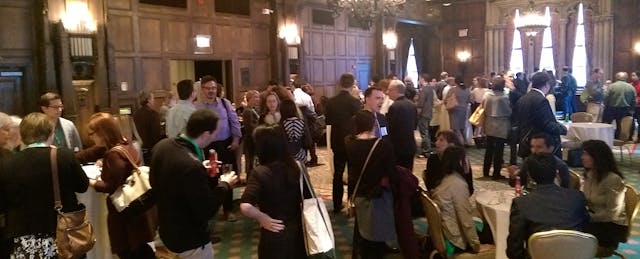From Billings, MT to Brooklyn, NY, journalists, reporters and others across the country shaping the public discourse on education gathered this week in Chicago for the Education Writers Association’s 68th Annual Seminar.
An estimated 500 writers were in attendance, and yes—everything was on-record. Here are a few sound bites from prominent education officials, scholars and researchers in the spotlight:
Arne Duncan, US Secretary of Education was vague about whether there will be consequences for states where many parents are opting children out of taking standardized tests. “States are supposed to work with districts… If states don’t do that then we have an obligation to step in.”
—As a parent of two kids in public schools who will be tested, Duncan said his family “do[es]n’t spend a lot of time worrying about this stuff.” He continued: “It’s not a traumatic event… It’s just part of most kids’ education growing up. Adults make a big deal and that makes it traumatic for the kids.”
—Education “technology can be a powerful tool to drive equity, but if we’re not careful, not smart it can definitely exacerbate the divide.”
—One of his biggest regrets: Efforts to make quality education accessible and equitable is still lagging. “Education isn’t seen as a national priority,” he said. “What we don’t have is enough parents beating down our door saying ‘go faster,’” said Duncan. “You never have critique saying ‘do more;’ the critique is always ‘slow down, slow down...’”
Illinois Governor Bruce Rauner did not hold back from criticizing the excessive and unnecessary bureaucracy in districts throughout the state. “The money should be in classrooms with teachers, technology, infrastructure and students,” he said. “Not in the bureaucracy.” He took a jab at Chicago Public Schools, calling it “a political patronage operation” throughout most of its history and stating flat-out that “schools don’t belong to the teachers’ union. They belong to the parents and the taxpayers.”
—On state testing: “We have the new PARCC system. I don’t know how I feel about it. I certainly don’t want the federal government controlling our curriculum in our classrooms...but we do need a consistent, rigorous, objective way to measure student growth.”
Scott Marion, Associate Director of the National Center for the Improvement of Educational Assessment, says standardized testing “is not going to help the kids who took the tests” because they’ve moved on by the time results come back. “These tests are useful for program and curriculum evaluation,” he said, “but for improving teaching and learning for kids, we need tests closer to the classroom.”
Marguerite Roza, Director of Edunomics Lab at Georgetown University: “There is a once in two-decades opportunity” when states reconsider their state finance formula for education. “That time is now,” she says, and pay heed, for we will “probably live with [the new formulas that get passed] until 2030.”
David Plank Executive Director, Policy Analysis for California Education and professor at the Stanford Graduate School of Education: Beyond state and federal funding, “look at non-official sources of revenues that schools enjoy,” he said. Schools in affluent communities in California, he noted, rely on volunteers to run critical parts of school operations, and “there are huge resource disparities” between communities across the country.
Diane Briars, President of the National Council of Teachers of Mathematics, wasn’t so convinced that letting teachers choose digital instructional materials on their own is a good idea. “If teachers are out searching for things on the web, that’s not a good thing,” she said. “Pulling from here and there to put together something is dangerous.” Her main concern with this piecemeal strategy: “How do you build coherence? Well-designed instructional materials follow a sequence.”
The winner of the EWA’s 2014 Fred M. Hechinger Grand Prize for Distinguished Education Reporting went to Nikole Hannah-Jones of ProPublica for her piece on the resegregation of public schools in the southern US. "If you're an education writer and aren't covering segregation in schools, I'd ask you why," she implored during her award acceptance speech.
Amar Kumar, Senior Vice President of Efficacy and Research at Pearson, claims that “for us to be really serious about efficacy, we will pull the plug on a product” even if it’s profitable. So how about the Pearson software on iPads, which has extremely underwhelmed LA Unified? “I’ve used the Pearson software and it’s incredible,” he claimed. Pearson representatives brought iPads to give journalists a chance to play with the app; it looked polished, at least aesthetically, at first glance.


